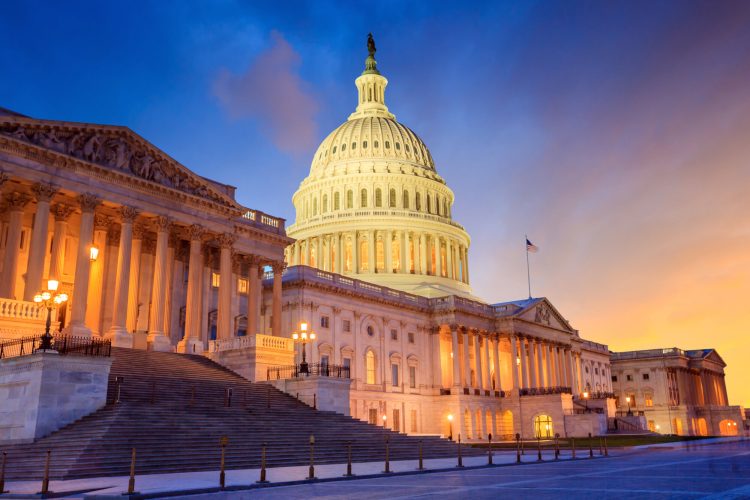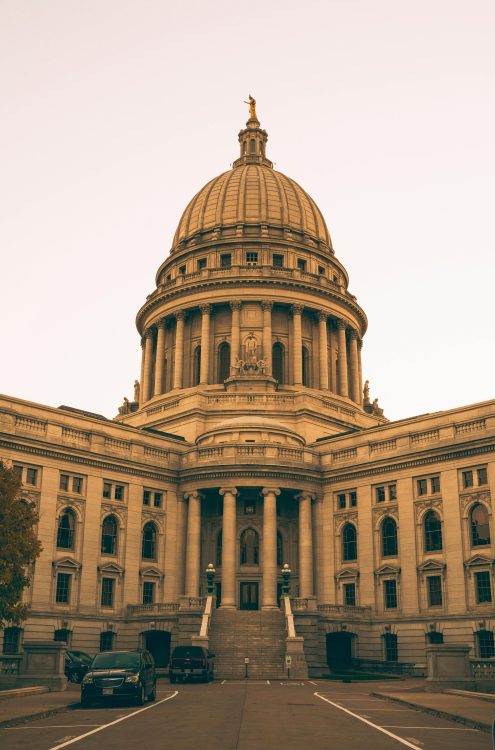This week on Facing the Future, we had an all-star panel of Congressional staff veterans taking a look at the results of this year’s midterm elections and what, if any, discernible impact they will have on some of the critical fiscal issues facing Congress. We were joined by Tom Kahn, a professor at American University and former Democratic staff director of the House Budget Committee. Also joining us was Pete Davis, who now heads his own investment advisory firm, who once served on the Republican staff of the Senate Budget Committee. Filling out the all-star panel were The Concord Coalition’s chief economist Steve Robinson and policy director Tori Gorman, who between them have decades of experience in various roles on Capitol Hill.
Even though there is a chance that control of the U.S. Senate may not be decided until a December runoff election in Georgia, it looks likely that Republicans will take over control of the House of Representatives by a very narrow margin. Before we even get to a new Congress however, there will be some pressing business essential to running the government upon which lawmakers will need to act. The continuing resolution currently funding government operations runs out on December 16th, which means appropriators will have to strike a deal on government funding before the new Congress is sworn in the first week of January.
“Republicans are going to have to make a fundamental choice,” said Kahn. “The question for them will be, do they want to do a continuing resolution to get them into the new year when they think they’ll be in the majority, so they can rewrite the bill and cut it? On the one hand, that is very appealing to them ideologically. On the other hand, they may decide they just want to clear the deck, and they don’t want to fight in 2023 over 2023 spending bills, that they’d rather start clearing the deck and deal with 2024.”
If the two sides cannot come to agreement on another continuing resolution, we could be facing a partial government shutdown right before Christmas, an outcome all sides would like to avoid. In addition to this concern, Pete Davis reminds us that Congress must also decide in the next few weeks whether certain federal tax breaks will be extended or be allowed to expire, and there will be pressure coming from all sides.
“There is a long list of tax extenders – roughly 40 of them,” said Davis. “Every time a lame duck session of Congress occurs, they have to deal with expiring tax provisions. Big business cares a lot about the R & D (research & development) expensing and the bonus depreciation. There will be a big push by liberal Democrats to try and get the expanded child care credit. There are some important Medicare provisions that need to happen. And there’s a sequester – a big hit to Medicare that will probably be undone. So they’ve got quite an agenda to get done before Thanksgiving. And then back in December for as long as it takes before they get everything done.”
The other major beast Congress must wrangle once again is the debt ceiling. The current debt limit set by Congress is $31.4 trillion, and we are getting very close to hitting that number, with our total debt as of this writing at $31.27 trillion. This means in the spring or possibly the summer of 2023, the federal government will reach that limit and won’t be able to borrow any more money to pay its bills. The Treasury Department can buy a little time by, for example, temporarily suspending the purchase of Treasury securities by other quasi-government accounts (“extraordinary measures”) but ultimately if Congress does not act to extend the debt ceiling, then the federal government will default on a portion of its debts which would have very dire economic consequences.
We came perilously close to that reality back in 2013 – the last time we had divided government with Republicans in control of the House, a Democratic Senate, and a Democrat (President Obama) in the White House. Unfortunately, debating the debt ceiling limit has become a dangerous game of political chicken, in which the opposition uses this must-pass legislation to try to extract concessions from the administration. Kahn says to avoid a dynamic in the next Congress similar to what we saw a decade ago, Democrats might try to push through a debt ceiling extension now, using budget reconciliation that is not subject to a Senate filibuster and can pass with a simple majority.
“I have talked to the senior staff both on the House and Senate Budget Committee majority, and this is very much under discussion and consideration right now,” said Kahn. “The challenge is, they will have to first pass a budget resolution for fiscal year 2023 which they have not yet done. And it could be a skeleton budget resolution. But that takes up to 50 hours, and you’ve got vote-a-rama to deal with, and then you have to do a reconciliation bill, and that’s 20-30 hours on the Senate floor. So it would be very time consuming, and there’s not a lot of time, and [Senate Majority Leader Chuck] Schumer will want to do a lot of things in the lame duck session. But on the other hand, there is high anxiety about two things: if Republicans are in charge of the House and/or the Senate, it will be inordinately difficult to pass a debt ceiling increase. And secondly, the price that they will demand in return for passing a debt ceiling increase, which is cuts in Social Security and Medicare, are not ones that President Biden can sign.”
According to Kahn, one major obstacle to this strategy is that not all 50 Democrats in the Senate needed to push through a debt ceiling reconciliation bill are on board with the idea. Concord’s policy director Tori Gorman also gives the approach long odds.
“While I think it would be a neat idea to save the domestic economy from another manufactured crisis, I just don’t think we’re going to get there,” said Gorman. “There are too many hurdles. First, you actually have to put in a number in the reconciliation bill. The legislation literally says ‘we’re increasing the debt limit by X amount.’ Democrats couldn’t find the votes to do that last summer when they were doing their reconciliation bill on Build Back Better. They’re certainly not going to be able to find the votes for it now, when that number is only just going to be much, much larger.”
Hear more on Facing the Future. I host the program each week on WKXL in Concord N.H., and it is also available via podcast. Join our guests as we discuss issues relating to national fiscal policy with budget experts, industry leaders, and elected officials. Past broadcasts are available here. You can subscribe to the podcast on Spotify, Pandora, iTunes, Google Podcasts, Stitcher, or with an RSS feed. Follow Facing the Future on Facebook, and watch videos from past episodes on The Concord Coalition YouTube channel.
Continue Reading











